More local government employees agree that they ‘know what behaviour constitutes corruption’ in 2022 compared to 2016.
Ninety per cent agree that they ‘know what behaviour constitutes corruption’, with 52 per cent strongly agreeing. This result is significantly higher compared to the findings from the 2016 survey (84% strongly agree + agree).
Corruption is seen to be a problem that exists in Victoria but is perceived to be a problem in other workplaces.
Perceptions that corruption happens and is a problem in Victoria, as well as within the workplaces of survey participants, have increased significantly since 2016.
In 2022, six in 10 employees (62%) agree that corruption is a problem in Victoria, fewer (17%) agree that it is a problem in their workplace. This increases to 23 per cent among those who work in depot operations where significantly more agree that corruption is a problem in their workplace.
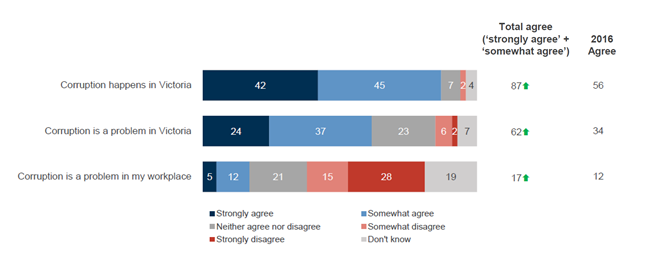
Corruption or misconduct risks in local government are often identified to be in recruitment or procurement.
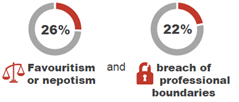 Victorian public sector employees were asked to nominate the most significant corruption or misconduct risks facing their organisation. A little over half of respondents identified at least one risk. The key risks identified included inappropriate recruitment procedures, bullying and harassment of staff, inappropriate procurement, or other misuse of funds. Comments also focus on risks around bribery, fraud and gifts or conflicts of interest, bias, or political influences. Councillors or developers are mentioned in a range of risks.
Victorian public sector employees were asked to nominate the most significant corruption or misconduct risks facing their organisation. A little over half of respondents identified at least one risk. The key risks identified included inappropriate recruitment procedures, bullying and harassment of staff, inappropriate procurement, or other misuse of funds. Comments also focus on risks around bribery, fraud and gifts or conflicts of interest, bias, or political influences. Councillors or developers are mentioned in a range of risks.
Overall, more than two-thirds of local government employees say there is a ‘high’ or ‘medium’ risk of favouritism in their organisation, with 22% perceiving it to be a ‘high’ risk. This is consistent with the findings from 2019.
By comparison, there has been a significant decrease in the per cent of local government employees perceiving a medium or high risk of breaching professional boundaries (64% in 2022 compared to 68% in 2019).
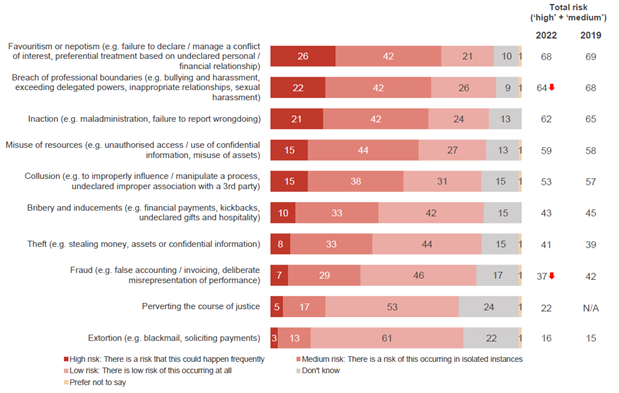
Behaviour outside work (such as external employment or public commentary) is the area where the risk of improper behaviours occurring is considered greatest – 43% rate this a ‘high’ or ‘medium risk’, although this has decreased significantly compared to 2019 (50%). Human resources management (38%) and procurement (30%) are the other main functions within an organisation rated as at higher risk of improper behaviours occurring.
More than a third of local government employees have observed or suspected a breach of professional boundaries or favouritism in the past 12 months.
One in eight local government employees (13%) claim that they personally observed favouritism or nepotism in the last 12 months. Slightly more (16%) have personally observed a breach of professional boundaries. Between 79 and 85 per cent of local government employees reported they neither suspected nor observed many of the serious forms of improper behaviour within their organisation, such as fraud, theft, bribery, or extortion.
Employees in depot operations have a higher incidence of observing or suspecting all types of improper behaviours.
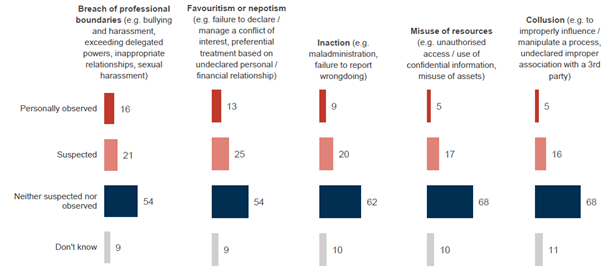
Most Victorian local government employees perceive risk, but not a ‘high risk’, of gifts being offered or accepted.
A little over half of Victorian local government employees (55%) think there is a ‘medium’ or ‘high’ risk of employees in procurement being offered gifts worth more than $50. A similar proportion (51%) see the same levels of risk that those gifts will be accepted. However, the risk that local government employees would ask for a gift is much lower (29% report a ‘medium’ or ‘high’ risk of this happening).
Managers (64%) and those working in civic development (61%) are significantly more likely to consider the risk to be higher for a supplier offering gifts or benefits. Managers (58%) were also more likely to consider the risk to be higher that employees would accept gifts or benefits.
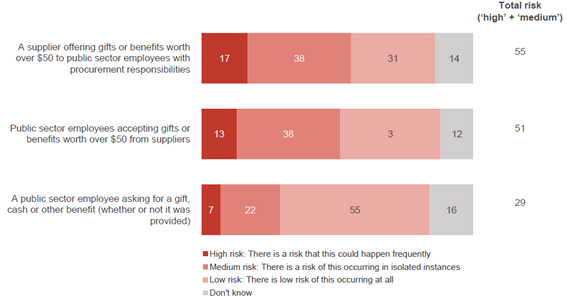
Victorian local government employees typically describe the ethical culture of their organisation as ‘strong’ or ‘moderate’.
In 2022, most local government employees (88%) describe the ethical culture of their organisation as ‘strong’ (46%) or ‘moderate’ (42%). The remaining 12 per cent rate the ethical culture as ‘weak’. Employees working in depot operations were significantly more likely to rate the ethical culture as weak (16%).
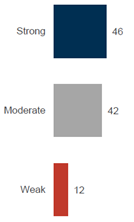
The findings are consistent with the 2019 survey where 88 per cent rated the ethical culture as ‘strong’ or ‘moderate’.
Local government employees identified reasons for how they rated the ethical culture at their organisation. Among those who feel their culture is ‘strong’, comments often mention transparency, open discussions, and modelling of the required behaviours by management. Those who rate the ethical culture of their organisation as ‘weak’ describe managements’ demonstration of ethical values as not ‘walking the walk’.

Most local government employees (60%) believe their organisation has a moderate level of vulnerability to corruption and misconduct.
Just under one in 10 employees rate their organisation as ‘highly vulnerable’ (8%) to corruption and misconduct. A third (32%) consider their organisation is ‘not vulnerable’ (up from 19% in 2019).
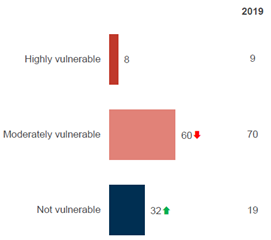


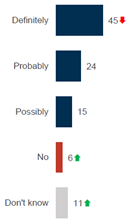
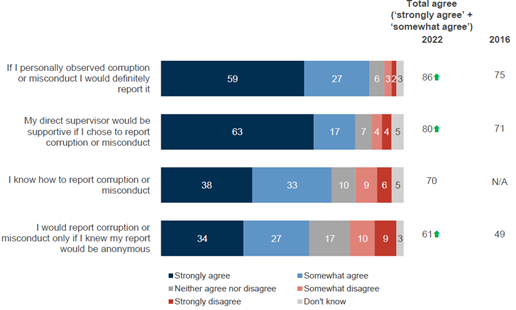
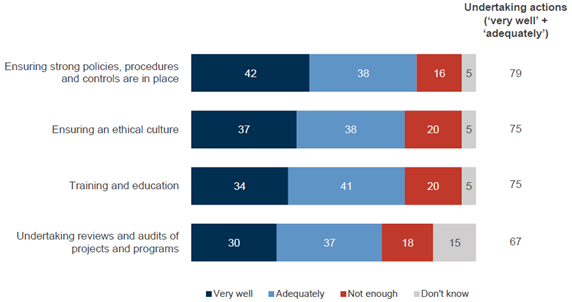
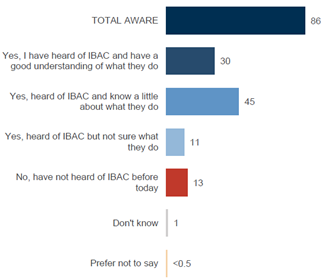
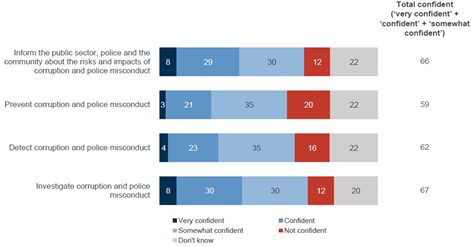

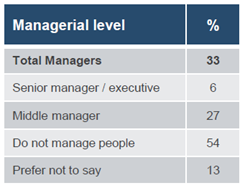 Sex
Sex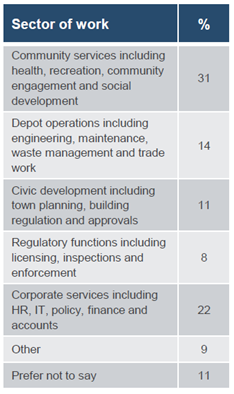 Experience
Experience